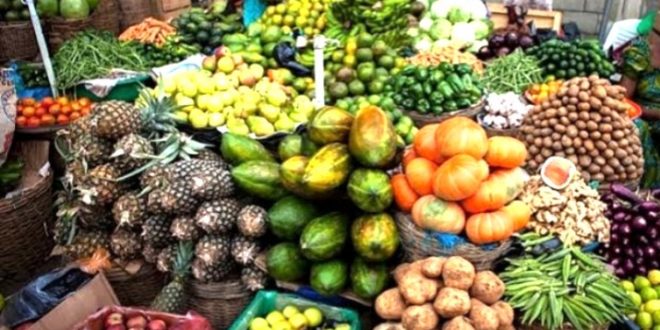Opinion:
By Wole Shokunbi
The world food day is a day set aside by United Nations Organization (UNO) through one of its agencies, Food and Agriculture Organization (FAO) on 16th October of every year to celebrate andadvance the course of food security globally especially in times of crisis.
According to Food and Agriculture organization(FAO) , the celebration is to create awareness for people who do not have enough resources to provide for food and as a result leading to hunger and serious starvation. It also serves as an avenue for implementing agricultural policies by government across the globe towards ensuring that food is available for people.
The major concern of FAO, a specialized agency of UNO is primarily to lead international efforts to defeat hunger. It is designed by UNO to achieve food security for all where people will have regular access to high quality food for healthy living.
But, how far have these countries of the world actualize this goal when countries like Kenya, Philippine, Pakistan and other third world countries find it difficult to cater for the need of their citizens due to skyrocketing of foods thereby throwing a large number of children into hunger.
Reports from UN indicate that over 800 million people globally still do not have enough food to eat while so many people are suffering from malnutrition because of poor feeding. As a result of this global challenges, the international community through FAO in conjunction with various governments and international stakeholders and Non –Governmental Organizations. (NGO) are working round the clock towards finding a lasting political will strong enough to break the cycle of poverty by promoting the new global development goal on hunger.
In Nigeria, Governments at all levels have designed so many programmes in agricultural sector to alleviate the suffering of the masses by ensuring food security in the country. The country hadwitnessed Operation Feed the Nation (OFN) during the regime of Chief Olusegun Obasanjo between 1976 to 1979 as military head of State whichrecorded a strong impact in ensuring food security in the country. There was also green revolution aimed at achieving same purpose but sustainability and continuity have been the bane of such lofty programmes in agriculture sector with many more of such programmes designed to enhance food security by successive governments that have hit the rock.
The culture of continuity for the lofty programmeshould be embraced by successive governments to enhance food security, but so pathetic that thereverse is the case. The challenges confronting the sector in particular and the country as a whole got worsen with both the federal and state governments devoting only paltry sum of money to agriculture in their budgets. The Agricultural Sector later got a relief during the return of democracy to Nigeria in 1999 where both Governments invested heavily in agricultural sector with the provision of funds, equipment, farm inputs such as fertilizer and so on to boost economy using the sector.
In Ogun State, the present administration under Prince Dapo Abiodun has put in place programmetowards supporting the people particularly farmers with the provision of farm implements and inputs to boost food production in the state. Apart from this, there has been a good synergy between the state government and various farmers associations in the state in preparing for the raining season through aids and grants to solve the problems of food crisis and hunger.
In view of ensuring food security and providing enabling environment for farmers and farming businesses to thrive, the state government facilitated a programme called Anchor Borrower Programmefrom the Central Bank of Nigeria (CBN) which assisted over 3,500 farmers drawn across all the twenty local governments areas of the state with over N700 million with each farmer receiving sixty bundles of improved cassava stems, four bags of fertilizers, eleven litres of herbicides and cash worth over N250,000.00 each.
Rice farmers have also received support from government by providing 120,000 hectares of farmlard for cultivation of rice while 385 new fish ponds/tanks in fish farming, it has constructed and maintained 300 fish farmers across the state. In addition, over 200 beneficiaries were given over N74million to boost their businesses in the cultivation of cassava, maize, rice, yam and vegetables as well as engaging in poultry, fisheries, piggery, snailery among others large ruminants and Agro-Processing.
The state Government in partnership with the Federal Government distributed improved varieties of plantain , banana and pineapple to 100 farmers as a way of promoting farmers productivity. It had constructed four solar powered boreholes to make a total of eleven solar powered boreholes to providepotable water for over 2,500 farmers in the state.
With so much efforts put in place in eradicating hunger, poverty and starvation, the state government should consolidate on the gains expected from the sector by ensuring that chunk of money is allocated to the sector from the annual budget and ensure its full implementation to actualize the set objectives.
The Federal Government as a matter of urgencyshould declare a state of emergency in Agricultural sector and diversify the country’s economy from oil sector to agriculture so as to grow nation’s economy and improve its Gross Domestic Product (GDP).
In achieving the set goal on global food security, the United Nations through Food and Agricultural Organization (FAO) should mandate members countries to invest heavily in the sector and also set up monitoring team that will ensure fund budgeted for the sector is fully expended and not diverted for other uses so that the set goal of establishing FAOat providing food in abundance for average people can be achieved.
In a nutshell, this year celebration of world food day should be used to address the perennial food crisis facing the nations of the world so that efforts of various governments put in place for abundance food supply and bring quality and nutritious food to the table of average common man would not be in vain.
Also, the celebration should be an avenue for governments to take stock of the huge investment in agricultural sector to determine challenges and proffer solution to further promote government investment in the sector.
Furthermore, concerted efforts should be put in place by Government at all levels to formulate policies that would encourage average masses to engage in household farming method that will put food on their table and make life more bearable within their locality.
The present administration in the state should continue to be farmers friendly by investing heavily into the sector and providing enabling environment for farmers to thrive. With government commitment at celebrating the yearly world food day, every citizen will be more encouraged to farm and gets the varieties of foods they want to eat at ensuringhealthy living.
*Wole Shokunbi, is the immediate past chairman, Nigeria Union of Journalists (NUJ),Ogun state council.
 Startrend International Magazine For Your Latest News And Entertainment Gists
Startrend International Magazine For Your Latest News And Entertainment Gists





